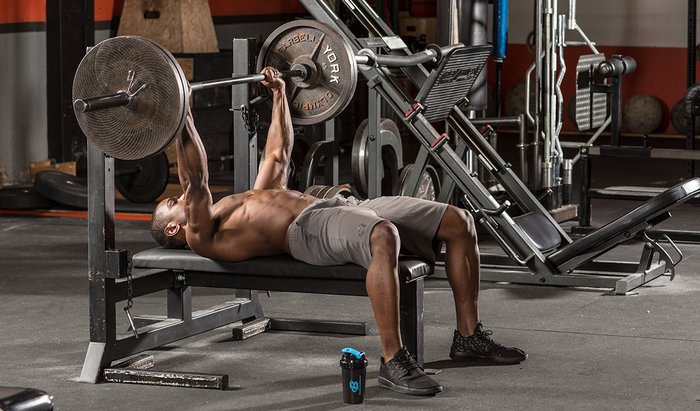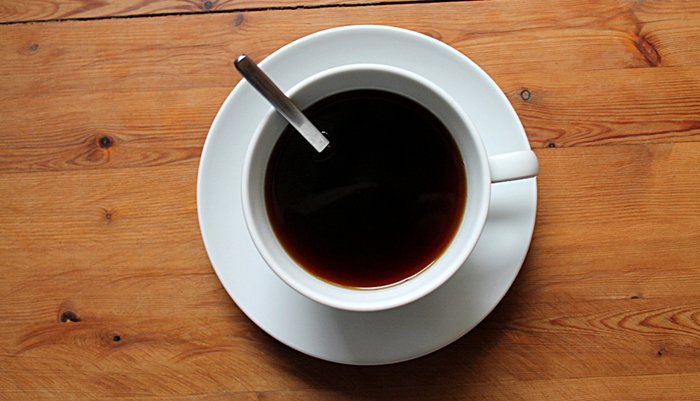Nearly 80 percent of adults in the U.S. consume caffeine in one form or another every day. For most of us, it's a way of life, how we get out of bed in the morning, or make it through an afternoon workout. But it does a lot more than just help overcome your brain's grogginess or deliver a blast of energy. Taken in the right amount and at the right time, caffeine can boost your performance in the gym and may even help you recover faster!
Once you understand how and why your caffeine works, you can start strategizing to get the most bang for your buck out of the ingredient. Here are the top five things you should know about caffeine and how to use it more effectively!
1. Caffeine Can Help Get You Extra Reps In The Gym
Caffeine does more than just give you a jolt in your pre-workout; it can actually help block specific receptors located throughout the body that are responsible for feelings of fatigue. This can translate into more reps, more sets, and overall greater training volume.

Caffeine can actually help block specific receptors located throughout the body that are responsible for feelings of fatigue. This can translate into more reps, more sets, and overall greater training volume.
A 2012 study published in the Journal of Strength and Conditioning Research found that 180 milligrams of caffeine consumed 60 minutes before a bout of resistance exercise resulted in significantly more reps being completed in the bench press, deadlift, back squat, and row.[1] The group that supplemented with caffeine also experienced lower ratings of perceived exertion. Caffeine has also been shown to improve maximal lower-body strength as well as sprint performance.[2,3]
In order to maximize the antifatiguing benefits of caffeine, I would recommend being a little more strategic with how often you take it. The more habituated you are, the less likely you'll feel the effects of caffeine. Try to save your pre-workout caffeine for days when you know you've got a grueling workout ahead or you plan on doing some PR testing.
2. Caffeine Can Keep You Focused During Your Workouts
Morning-coffee drinkers know the best cure for morning grogginess is a shot (or two) of caffeine. That's because caffeine, also known as nature's stimulant, helps to dial down the amount of neurotransmitters like dopamine and serotonin that can make you feel tired and drowsy. The cognitive boost caffeine can deliver won't just help get you out of bed and off to work in the morning, it can also help you stay focused during your workouts.
A review study published in the Journal of Strength and Conditioning found that caffeine taken before strenuous training sessions helped to sustain exercise intensity and improved concentration.4 This was especially true in those subjects who were lacking in hours of shut-eye.

The cognitive boost caffeine can deliver won't just help get you out of bed and off to work in the morning, it can also help you stay focused during your workouts.
Caffeine intake can also lead to improvements in reaction time, potentially helping athletes who participate in sports that require quick decision-making skills like soccer, football, and baseball.[5]
Too much caffeine can actually have the opposite effect on you, so the best way to experience optimal effects is to take roughly 300 milligrams up to 60 minutes before your workout. It's also best to time your caffeine intake when you most need it, either first thing in the morning or before a workout.
3. Caffeine Can Alleviate Post-Workout Muscle Soreness
Here's something I'll bet you didn't know: Caffeine taken pre-workout can help reduce the all-too-common DOMS (delayed-onset muscle soreness) that accompanies a grueling workout.
A 2013 study published in the Journal of Strength and Conditioning found that those who supplemented with caffeine before their workout reported significantly lower levels of soreness compared to a placebo, even though they were able to complete more repetitions during their lifting session.[6]
It's believed that caffeine can reduce the activity of adenosine—a substance in the body associated with fatigue that's increased during injury or heavy exercise. Decreasing the perception of pain and soreness in the days that follow a strenuous resistance-training workout may allow you to increase the number of training sessions per week and, over time, could lead to greater muscular growth.
4. Caffeine Helps Refuel You Post-Workout
It's well-established that consuming caffeine pre-workout can improve performance, but caffeine following your training session can actually help your muscles refuel at a faster rate. Research published in the Journal of Applied Physiology found that subjects who consumed caffeine with their post-workout carbs had significantly higher rates of glycogen resynthesis compared to the carb-only group.[7] In fact, the carb-plus-caffeine group had 66 percent more muscle glycogen than the carb-only group. That's 66 percent more fuel in the tank during your next workout!

It's well-established that consuming caffeine pre-workout can improve performance, but caffeine following your training session can actually help your muscles refuel at a faster rate.
Although scientists are not 100 percent certain how caffeine increases glycogen resynthesis, higher glucose and insulin levels, as well as an increase in the activity of several signaling enzymes responsible for glucose transport, are likely to be factors.
5. Caffeine Can Accelerate Fat Loss
Numerous studies have demonstrated caffeine's ability to enhance fat oxidation (your body's ability to break down stored fat into usable energy) during exercise.[8,9] Caffeine stimulates the nervous system and increases levels of the hormone epinephrine, both of which can signal your body to break down fat. While this alone won't cause significant fat loss, combining caffeine with proper nutrition and a well-rounded fitness program may help you shed a few extra pounds and improve your body composition.
Caffeine has also been shown to increase resting energy expenditure (or the amount of calories you burn at rest) for up to three hours post-ingestion.[10] This doesn't give you the green light to go hog-wild at an all-you-can-eat buffet , but an extra 200-300 calories burned each day could lead to noticeable weight loss over time.
How To Maximize The Benefits Of Caffeine
So what's the best way to take in your caffeine to reap all of the benefits it has to offer? Current recommendations state that for performance benefits, trained individuals should consume 1-2 milligrams per pound of body weight 30-60 minutes prior to exercise, never exceeding more than 400 milligrams per day 11 Because each person responds a little differently to caffeine, start on the lower end and gradually increase your dosage from there. Just be warned that too much caffeine can leave you feeling nauseated, coping with a stomachache, or suffering from the caffeine jitters.

Just be warned that too much caffeine can leave you feeling nauseated, coping with a stomachache, or suffering from the caffeine jitters.
You can build up a tolerance to caffeine, so it's best to cycle on and off every 4-6 weeks, or look for a product that also contains TeaCrine®, the patented form of theacrine. Studies suggest that TeaCrine® acts in a similar manner as caffeine, but is non-habit-forming and can even reduce the habituation to caffeine when used in combination.
Furthermore, coffee may work well enough to get you out of bed in the morning, but if you're looking to take your workouts to the next level, stick with pure forms of caffeine like caffeine anhydrous, and avoid sugary energy drinks.
References
- Duncan, M. J., Smith, M., Cook, K., & James, R. S. (2012). The acute effect of a caffeine-containing energy drink on mood state, readiness to invest effort, and resistance exercise to failure. The Journal of Strength & Conditioning Research, 26(10), 2858-2865.
- Trexler, E. T., Smith-Ryan, A. E., Roelofs, E. J., Hirsch, K. R., & Mock, M. G. (2015). Effects of coffee and caffeine anhydrous on strength and sprint performance. European Journal of Sport Science, 1-9.
- Beck, T. W., Housh, T. J., Schmidt, R. J., Johnson, G. O., Housh, D. J., Coburn, J. W., & Malek, M. H. (2006). The acute effects of a caffeine-containing supplement on strength, muscular endurance, and anaerobic capabilities. The Journal of Strength & Conditioning Research, 20(3), 506-510.
- Sökmen, B., Armstrong, L. E., Kraemer, W. J., Casa, D. J., Dias, J. C., Judelson, D. A., & Maresh, C. M. (2008). Caffeine use in sports: considerations for the athlete. The Journal of Strength & Conditioning Research, 22(3), 978-986.
- Church, D. D., Hoffman, J. R., LaMonica, M. B., Riffe, J. J., Hoffman, M. W., Baker, K. M., ... & Stout, J. R. (2015). The effect of an acute ingestion of Turkish coffee on reaction time and time trial performance. Journal of the International Society of Sports Nutrition, 12(1), 1-11.
- Hurley, C. F., Hatfield, D. L., & Riebe, D. A. (2013). The effect of caffeine ingestion on delayed onset muscle soreness. The Journal of Strength & Conditioning Research, 27(11), 3101-3109.
- Pedersen, D. J., Lessard, S. J., Coffey, V. G., Churchley, E. G., Wootton, A. M., Watt, M. J., & Hawley, J. A. (2008). High rates of muscle glycogen resynthesis after exhaustive exercise when carbohydrate is coingested with caffeine. Journal of Applied Physiology, 105(1), 7-13.
- Gahreman, D., Wang, R., Boutcher, Y., & Boutcher, S. (2015). Green Tea, Intermittent Sprinting Exercise, and Fat Oxidation. Nutrients, 7(7), 5646-5663.
- Hodgson, A. B., Randell, R. K., & Jeukendrup, A. E. (2013). The effect of green tea extract on fat oxidation at rest and during exercise: evidence of efficacy and proposed mechanisms. Advances in Nutrition: An International Review Journal, 4(2), 129-140.
- Vaughan, R. A., Conn, C. A., & Mermier, C. M. (2014). Effects of commercially available dietary supplements on resting energy expenditure: a brief report. ISRN nutrition, 2014.
- Goldstein, E. R., Ziegenfuss, T., Kalman, D., Kreider, R., Campbell, B., Wilborn, C., ... & Wildman, R. (2010). International society of sports nutrition position stand: caffeine and performance. Journal of the International Society of Sports Nutrition, 7(1), 5.

